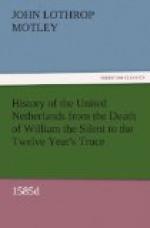Thus it would appear that it was Sainte Aldegonde who was chiefly anxious to effect the reconciliation of Holland and Zeeland with the King. The initiative of this project to include all the United Provinces in one scheme with the reduction of Antwerp came originally from him, and was opposed, at the outset, by the magistrates of that city, by the Prince of Parma and his councillors, and, by the States of Holland and Zeeland. The demonstrations on the part of the preachers, the municipal authorities, and the burghers, against Sainte Aldegonde and his plan for a secret interview, so soon as it was divulged, made it impossible to carry that project into effect.
“Aldegonde, who governs Antwerp,” wrote Parma to Philip, “was endeavouring, eight days ago, to bring about some kind of negotiation for an accord. He manifested a desire to come hither for the sake of a personal interview with me, which I permitted. It was to have taken place last Sunday, 16th of this month, but by reason of a certain popular tumult, which arose out of these circumstances, it has been necessary to defer the meeting.”
There was much disappointment felt by the royalist at this unsatisfactory result. “These bravadoes and impertinent demonstrations on the part of some of your people,” wrote Richardot, ten days later, “will be the destruction of the whole country, and will convert the Prince’s gentleness into anger. ’Tis these good and zealous patriots, trusting to a little favourable breeze that blew for a few days past, who have been the cause of all this disturbance, and who are ruining their miserable country—miserable, I say, for having produced such abortions as themselves.”




